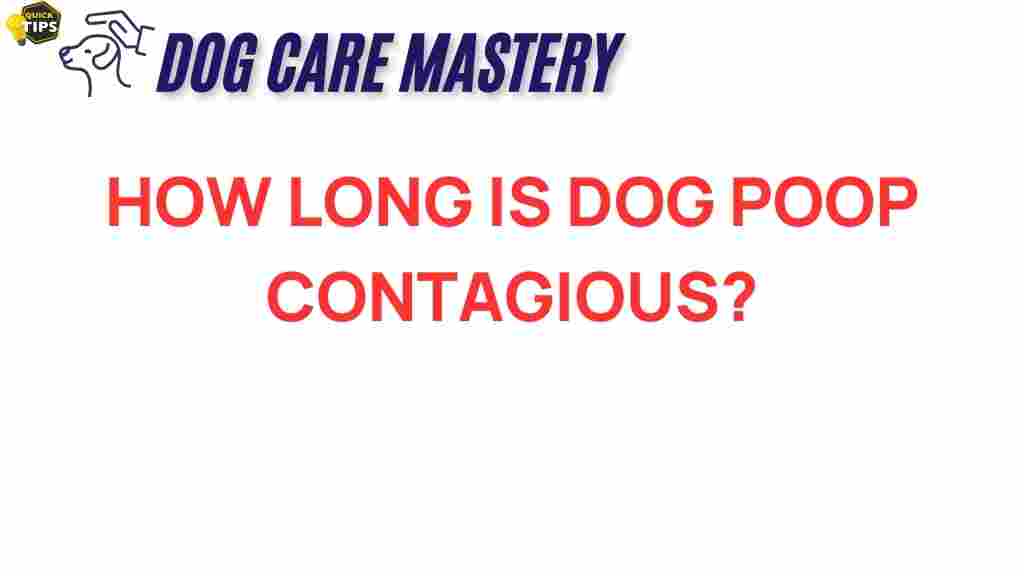The Surprising Truth: How Long Is Dog Poop Contagious?
When it comes to our furry friends, we often think about their health and well-being, but one topic that rarely receives attention is the presence and impact of dog poop. As pet owners, it’s essential to understand the potential health risks associated with dog waste, especially when it comes to its contagious nature. In this article, we will explore the surprising truth about how long dog poop can remain contagious and what you can do to mitigate any risks.
Understanding Dog Poop and Its Contagious Nature
Before delving into how long dog poop can be contagious, it’s vital to understand what makes it potentially harmful. Dog waste can contain various pathogens, including:
- Bacteria (e.g., Salmonella, E. coli)
- Viruses (e.g., Parvovirus, Canine Distemper)
- Parasites (e.g., Giardia, roundworms, hookworms)
Each of these pathogens has a different lifespan outside a host, affecting how long dog poop can remain a risk to other dogs and even humans. Understanding this can help you keep your dog and your family safe.
How Long Is Dog Poop Contagious?
The contagiousness of dog poop varies significantly depending on the specific pathogen present in the waste. Here’s a breakdown of how long some common pathogens can survive:
- Salmonella: Can survive in the environment for several months.
- E. coli: Typically remains infectious for days to weeks, depending on environmental conditions.
- Parvovirus: Extremely resilient, can survive for years in the environment.
- Giardia: Cysts can remain infectious in soil and water for several months.
- Roundworms: Eggs can survive in the environment for years.
As you can see, the lifespan of pathogens in dog poop can be quite lengthy, which poses a risk to other pets and even humans in some cases.
Step-by-Step Process: Reducing the Risk of Contagion
Now that we understand the potential risks associated with dog poop, let’s look at some practical steps you can take to minimize exposure and protect your pets and family:
1. Promptly Clean Up After Your Dog
The best way to prevent the spread of pathogens is to clean up after your dog immediately. Here’s how to do it:
- Always carry waste bags when walking your dog.
- Use a scooping motion to pick up the waste.
- Seal the bag tightly before disposing of it in the trash.
2. Maintain a Clean Yard
If you have a yard, regularly inspect it for any leftover dog poop and clean it up to prevent contamination of soil and grass.
3. Regular Vet Check-Ups
Schedule regular veterinary visits for your dog. Vets can check for parasites and other health issues that may be contributing to unhealthy waste.
4. Educate Your Family
Make sure everyone in your household understands the importance of avoiding contact with dog poop and the potential risks involved.
5. Use Enzymatic Cleaners
Consider using enzymatic cleaners to break down organic matter in your yard or any areas where your dog may have defecated. This can help eliminate lingering pathogens.
Troubleshooting Common Issues
Despite your best efforts, you may encounter some challenges while managing dog poop. Here are some common issues and how to address them:
1. My Dog Keeps Getting Infected
If your dog continues to show signs of infection despite your efforts, consider the following:
- Consult your veterinarian for a thorough examination.
- Ensure all household pets are up-to-date on vaccinations.
- Discuss preventive medications for parasites.
2. My Yard Smells Bad
A persistent smell in your yard may indicate leftover waste or decaying organic matter. To troubleshoot:
- Regularly inspect and clean your yard.
- Use baking soda or vinegar to neutralize odors.
- Consider using pet-safe deodorizing sprays.
3. My Dog Refuses to Potty Outside
If your dog is reluctant to go outside, it may be due to fear or discomfort. To help:
- Ensure the outdoor area is clean and safe.
- Provide positive reinforcement when your dog goes outside.
- Gradually acclimate your dog to the outdoor environment.
When to Seek Professional Help
If you notice any signs of illness in your dog, such as vomiting, diarrhea, or unusual lethargy, it’s crucial to consult your veterinarian. They can perform tests to determine if any pathogens from dog poop are affecting your dog’s health.
Conclusion
Understanding the contagious nature of dog poop is essential for responsible pet ownership. By taking proactive steps to manage waste and educate yourself on potential health risks, you can help protect your dog and your family from harmful pathogens. Remember, the key to a healthy pet and a safe environment lies in prompt clean-up, regular veterinary care, and ongoing vigilance.
For more information about pet health and safety, check out this informative resource. Additionally, don’t forget to visit our other articles on pet care here!
This article is in the category Health and created by dogcaremastery Team
